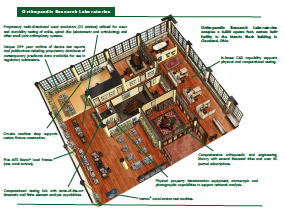Standards Testing

Standards Testing - Knee
For more than four decades, ORL is recognized as an innovator of testing standards and methods with an extensive track record of providing information necessary for successful regulatory approvals, product quality confirmation, marketing materials and surgeon education. This Standards listing encapsulates the breadth of this expertise.
ASTM F1223 - Standard Test Method for Determination of Total Knee Replacement Constraint
This test method quantifies total knee replacement motion characteristics delineated by the inherent articular design as determined under specific loading conditions.
ASTM F1672 - Standard Specification for Resurfacing Patellar Prosthesis
This specification provides basic descriptions and characteristics of material and device geometry for patellar resurfacing devices that have been determined to be important to in-vivo performance.
ASTM F1800 - Standard Practice for Cyclic Fatigue Testing of Metal Tibial Tray Components of Total Knee Joint Replacements
This practice covers a procedure for the fatigue testing of metallic tibial trays used in knee joint replacements using a cyclic, constant-amplitude force.
ASTM F1814 - Standard Guide for Evaluating Modular Hip and Knee Joint Components
This guide assists the developer of a modular joint replacement implant in the choice of appropriate tests and evaluations to determine device safety.
ASTM F2083 - Standard Specification for Knee Replacement Prosthesis
This specification is intended to provide basic descriptions of material and prosthesis geometry for primary and revision total knee replacement devices. Additionally, those characteristics determined to be important toin vivoperformance of the prosthesis are defined.
ASTM F2722 - Standard Practice for Evaluating Mobile Bearing Knee Tibial Baseplate Rotational Stops
This practice covers a laboratory-based in vitro method for evaluating the mechanical performance of materials and devices being considered for replacement of the tibio-femoral joint in human knee joint replacement prostheses in mobile bearing knee systems.
ASTM 2723 -Standard Test Method for Evaluating Mobile Bearing Knee Tibial Baseplate/Bearing Resistance to Dynamic Disassociation
This test method includes the use of static and fatigue shear and bending force conditions to evaluate the bearing retention mechanism of a mobile bearing knee design and its ability to prevent disassociation.
ASTM F2724 -Standard Test Method for Evaluating Mobile Bearing Knee Dislocation
This test method is designed to provide a standardized method to determine the dislocation resistance of mobile-bearing knee designs with regard to femoral component disassociation and spin-out/spit-out of the mobile bearing insert.
ASTM F2777 - Standard Test Method for Evaluating Knee Bearing (Tibial Insert) Endurance and Deformation Under High Flexion
This test method can be used to describe the effects of materials, manufacturing, and design variables on the fatigue/cyclic creep performance of UHMWPE bearing components subject to substantial rotation in the transverse plane (relative to the tibial tray) for a relatively large number of cycles.
ASTM F3140 - Standard Test Method for Cyclic Fatigue Testing of Metal Tibial Tray Components of Unicondylar Knee Joint Replacements
This test method covers a procedure for the fatigue testing of metallic tibial trays used in partial knee joint replacements. It is intended to provide useful, consistent, and reproducible information about the fatigue performance of metallic tibial trays with unsupported mid-section of the condyle.
ASTM F3141 - Standard Guide for Total Knee Replacement Loading Profiles
The purpose of this test guide is to provide load profile information on how one could test a total knee replacement in order to evaluate in vitro its function and wear during several types of knee motions.
ASTM F3161 - Standard Test Method for Finite Element Analysis (FEA) of Metallic Orthopaedic Total Knee Femoral Components under Closing Conditions
This standard is applicable to the calculation of stresses seen on a knee femoral component when loaded in a manner described in this test method. This method can be used to establish the worst-case size for a particular implant family.
ISO 7207-1 - Implants for surgery — Components for partial and total knee joint prostheses — Part 1: Classification, definitions and designation of dimensions
This part classifies femoral, tibial and patellar components for knee joint prostheses in which the bearing surfaces of one or more compartments of the knee are replaced.
ISO 7207-2 - Implants for surgery — Components for partial and total knee joint prostheses — Part 2: Articulating surfaces made of metal, ceramic and plastics materials
This part specifies surface finish requirements for the articulating surfaces of total and partial knee joint prostheses classified in ISO 7207-1.
ISO 14243-1 - Implants for surgery — Wear of total knee-joint prostheses — Part 1: Loading and displacement parameters for wear-testing machines with load control and corresponding environmental conditions for test
This part specifies the flexion/extension relative angular movement between articulating components, the pattern of the applied force, speed and duration of testing, sample configuration and test environment to be used for the wear testing of total knee-joint prostheses in wear-testing machines with load control.
ISO 14243-2 - Implants for surgery — Wear of total knee-joint prostheses — Part 2: Methods of measurement
This part specifies a method of assessment of wear of the tibial component of total knee-joint prostheses using the gravimetric technique for components tested.
ISO 14243-3 - Implants for surgery — Wear of total knee-joint prostheses — Part 2: Methods of measurement
This part describes a test method that specifies flexion/extension relative angular movement between articulating components, the pattern of the applied force, speed and duration of testing, sample configuration and test environment to be used for the wear testing of total knee-joint prostheses in wear-testing machines having axial load control, flexion/extension angular motion control, AP displacement control and tibial rotation control.
ISO 14243-5 - Implants for surgery — Wear of total knee prostheses — Part 5: Durability performance of the patellofemoral joint
This document specifies the relative angular movement between articulating patellofemoral joint components, the pattern of the applied force, speed and duration of testing, sample configuration and test environment to be used for the durability testing of total knee-joint prostheses in wear-testing machines with load control and displacement.
ISO 14879-1 - Implants for surgery — Total knee-joint prostheses — Part 1: Determination of endurance properties of knee tibial trays
This part specifies a test method for determining the endurance properties of tibial trays used in knee-joint prostheses to support and secure the plastic articulating surface.
ISO 17853 - Wear of implant materials — Polymer and metal wear particles — Isolation and characterization
Specifies methods for sampling wear particles generated by joint replacement implants in humans and in joint simulators.
ISO 21536 - Non-active surgical implants — Joint replacement implants — Specific requirements for knee-joint replacement implants
Provides specific requirements for knee joint replacement implants and specifies requirements for intended performance, design attributes, materials, design evaluation, manufacture, sterilization, packaging, information supplied by the manufacturer and methods of test.

